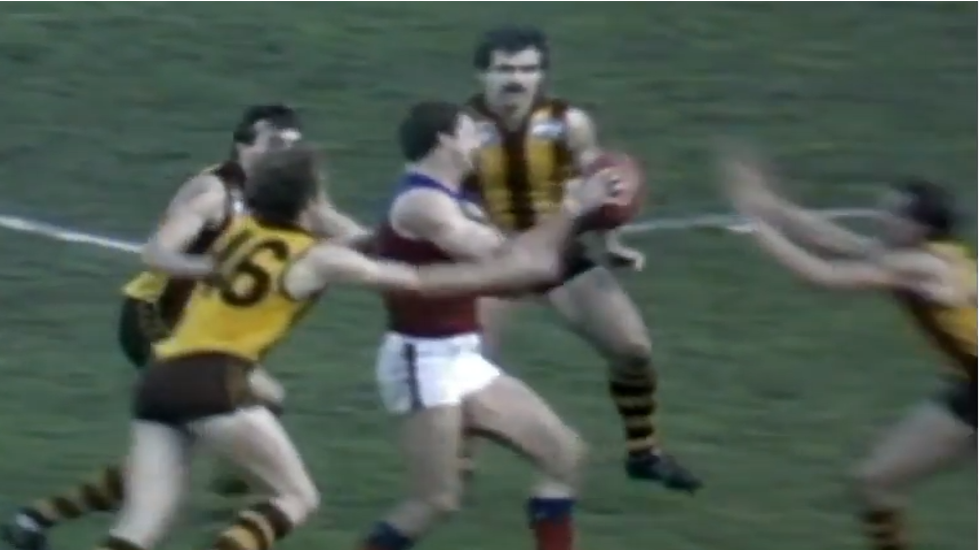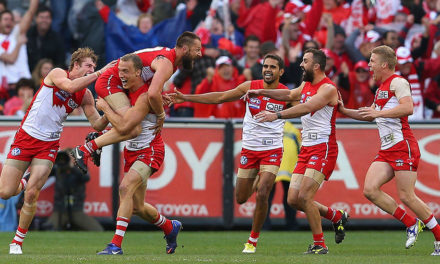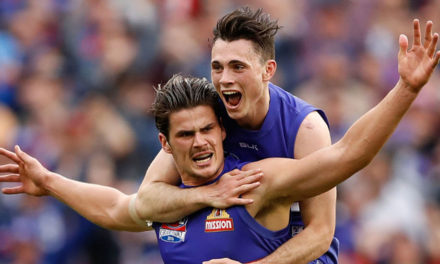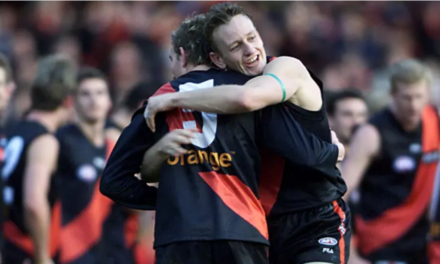Surrounded by Hawthorn defenders, Bernie Quinlan is about to burst clear and boot his eighth goal of the 1983 qualifying final. Picture: CHANNEL 7
The greatest moments from qualifying & elimination finals
With the first week of AFL finals finally upon us, what better than reminiscing on some of the greatest qualifying and elimination finals from years gone by to get in the mood before this weekend’s action?
There have been some truly great qualifying and elimination final moments over the years since the introduction of the final five in 1972, from Bernie Quinlan almost willing Fitzroy over the line against Hawthorn, to Lance Franklin’s first dominant finals performance against Adelaide.
Because, like a heartbreaking Peter Sumich behind at Waverley, or a full-forward shoot-out between Bill Brownless and Tony Lockett, so are the Rounds of our Lives.
HAWTHORN 19.13 (127) d FITZROY 19.9 (123) (MCG, qualifying final 1983)
Not even a herculean effort from Bernie Quinlan was enough to get Fitzroy over the line in an epic qualifying final against Hawthorn at the MCG.
The ‘Roys of 1983 were perhaps the best team Fitzroy had assembled since the club’s last grand final appearance in 1944.
Fitzroy finished the home-and-away season third on the ladder, and in round 13 defeated ladder leader North Melbourne by 150 points, in what remains the greatest defeat suffered by an eventual minor premier in league history.
Coming up against a battle-hardened Hawthorn outfit in September, Fitzroy hung on well early to enter quarter-time with scores tied, but were blown away in the second term and trailed by 27 points at the main break.
The third term was a closer affair, but the Roys still trailed by 21 points heading into the final term. Fitzroy was in trouble, with Terry Wallace and Russell Greene racking up plenty of the ball for the Hawks, and Peter Knights dominating up forward.
Enter Bernie Quinlan.
The 1983 Coleman medallist was having a quiet day up until that point, kicking only three goals. But “Superboot” exploded in the final term, kicking another five goals as the Lions mounted a late comeback.
At the 23-minute mark, Quinlan plucked the ball in mid-air from a throw-in, brushed off four Hawthorn defenders in the forward pocket and kicked a spectacular goal on his non-preferred left foot.
The goal – his eighth – put Fitzroy in front, and it seemed the Lions were destined for victory.
But alas, a free kick near goal awarded to Richard Loveridge only minutes later was duly converted, giving Hawthorn back the lead and sealing a four-point win in a bona fide finals classic.
To grasp the significance of the victory, one only has to compare the trajectory of the two clubs in the aftermath of the match.
Hawthorn went on to win the flag, the first of four flags won by the Hawks in the ‘80s. Fitzroy, meanwhile, went on to lose its semi-final against Essendon the following week and was consequently bundled out of finals in straight sets.
Just 13 years later, the struggling club merged with the Brisbane Bears and the iconic Fitzroy name vanished from the league.
NORTH MELBOURNE 20.6 (126) d CARLTON 16.11 (107) (Waverley, elimination final 1985)
North Melbourne recorded an impressive come-from-behind victory over Carlton in the 1985 elimination final, after an eight-goal final term.
Carlton was on top for most of the match, and almost doubled the Roos’ score by half-time. But after still leading by more than six goals early in the third quarter with Wayne Johnston dominating, the Roos suddenly switched into gear.
North youngsters such as Ross Smith and Darren Steele began to take control of the match, supported by inspirational skipper Wayne Schimmelbusch.
Conversely, experienced Carlton players like Wayne Harmes and David Rhys-Jones were shut out of the game. Added to the Blues’ woes was the fact they had just one fit player on the bench, and it became apparent late in the match they had run out of legs.
Carlton was still within one point late in the game, but goals to John Holt and David Dwyer secured the Roos an amazing 19-point win.
GEELONG 15.14 (104) d ST KILDA 14.13 (97) (Waverley, elimination final 1991)
In a classic full-forward shoot-out, Bill Brownless and Tony Lockett kicked 17 goals between them in a tense elimination final at Waverley.
Playing in its first finals series since 1973, St Kilda was desperate for victory, and had the Coleman medallist in Lockett to spearhead their forward line. But Geelong had Brownless, who proved a more than a handful for St Kilda’s defence.
After a six goals-to-one second term (including five from Lockett), the Saints led by 19 points at half-time. But Geelong slowly wrestled back momentum and led by one point heading into the final term.
The final stanza saw only three goals kicked, but it would be the Cats who were able to hold on and secure a memorable seven-point victory.
Despite losing the match, Lockett at least claimed honours in the shoot-out battle, kicking nine goals to Brownless’ eight.
COLLINGWOOD 13.12 (90) drew WEST COAST 13.12 (90) (Waverley, qualifying final 1990)
Weeks before Collingwood’s drought-breaking Grand Final victory in 1990, the Pies took part in a thrilling qualifying final against West Coast that ended in a draw.
Despite leading at every quarter break, the Eagles refused to wilt, with Chris Lewis causing headaches for the Magpies midfield.
Peter Daicos did his best to snuff out the West Coast resistance, kicking a magnificent checkside snap from the boundary line to put the Pies eight points up with five minutes remaining.
But after a classy goal from a Karl Langdon snap and a behind from Chris Waterman, the deficit was reduced to one point.
The Pies then looked set for a heartbreaking loss when Peter Sumich – who had already kicked four goals – marked deep in the forward pocket with 30 seconds remaining.
Needing to thread his kick from a tight angle and in the wrong pocket for a left-footer, he was unable to deliver, kicking a behind to draw the match.
The replay the following week caused no such dramas for the Magpies, who ran out 59-point winners.
HAWTHORN 15.15 (105) d ADELAIDE 15.12 (102) (Telstra Dome, elimination final 2007)
The Alastair Clarkson-led Hawthorn has been a formidable side for over a decade, but back in 2007, the Hawks were just an inexperienced side trying to make an impact in their first finals appearance in six years.
The seasoned Crows showed their finals experience initially, coming out of the blocks with a seven-goal first term.
But Hawthorn had an ace up their sleeve, an up-and-coming superstar in Lance “Buddy” Franklin, who proved the match-winner. Franklin had already kicked six goals when he marked just inside 50 in the final seconds of the match.
With the Hawks three points down, they needed a clutch goal and Buddy delivered, splitting the middle with a booming left-foot kick.
There was barely time for a restart when seconds later, the final siren sounded, heralding the first of many Hawthorn finals victories in the Clarkson era.











